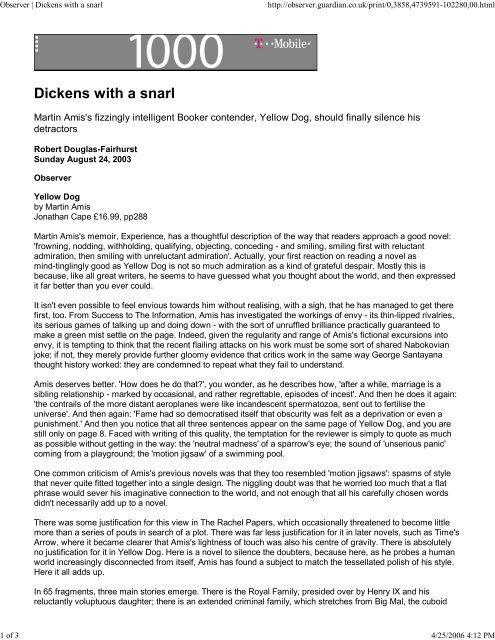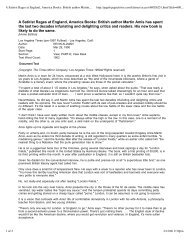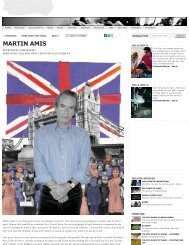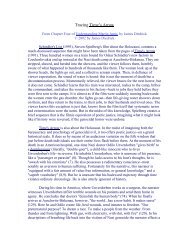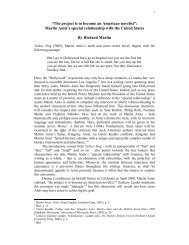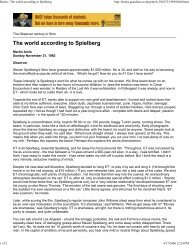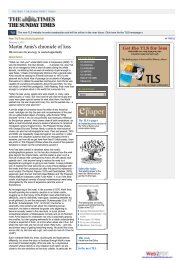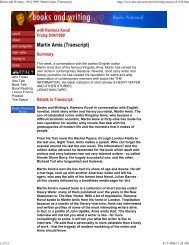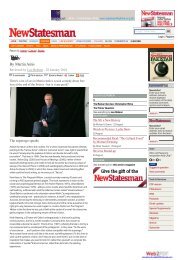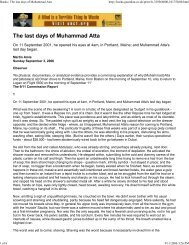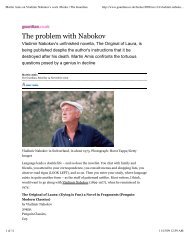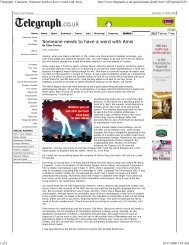Dickens with a snarl - Martin Amis
Dickens with a snarl - Martin Amis
Dickens with a snarl - Martin Amis
- No tags were found...
You also want an ePaper? Increase the reach of your titles
YUMPU automatically turns print PDFs into web optimized ePapers that Google loves.
Observer | <strong>Dickens</strong> <strong>with</strong> a <strong>snarl</strong>http://observer.guardian.co.uk/print/0,3858,4739591102280,00.html1 of 3 4/25/2006 4:12 PM<strong>Dickens</strong> <strong>with</strong> a <strong>snarl</strong><strong>Martin</strong> <strong>Amis</strong>'s fizzingly intelligent Booker contender, Yellow Dog, should finally silence hisdetractorsRobert DouglasFairhurstSunday August 24, 2003ObserverYellow Dogby <strong>Martin</strong> <strong>Amis</strong>Jonathan Cape £16.99, pp288<strong>Martin</strong> <strong>Amis</strong>'s memoir, Experience, has a thoughtful description of the way that readers approach a good novel:'frowning, nodding, <strong>with</strong>holding, qualifying, objecting, conceding and smiling, smiling first <strong>with</strong> reluctantadmiration, then smiling <strong>with</strong> unreluctant admiration'. Actually, your first reaction on reading a novel asmindtinglingly good as Yellow Dog is not so much admiration as a kind of grateful despair. Mostly this isbecause, like all great writers, he seems to have guessed what you thought about the world, and then expressedit far better than you ever could.It isn't even possible to feel envious towards him <strong>with</strong>out realising, <strong>with</strong> a sigh, that he has managed to get therefirst, too. From Success to The Information, <strong>Amis</strong> has investigated the workings of envy its thinlipped rivalries,its serious games of talking up and doing down <strong>with</strong> the sort of unruffled brilliance practically guaranteed tomake a green mist settle on the page. Indeed, given the regularity and range of <strong>Amis</strong>'s fictional excursions intoenvy, it is tempting to think that the recent flailing attacks on his work must be some sort of shared Nabokovianjoke; if not, they merely provide further gloomy evidence that critics work in the same way George Santayanathought history worked: they are condemned to repeat what they fail to understand.<strong>Amis</strong> deserves better. 'How does he do that?', you wonder, as he describes how, 'after a while, marriage is asibling relationship marked by occasional, and rather regrettable, episodes of incest'. And then he does it again:'the contrails of the more distant aeroplanes were like incandescent spermatozoa, sent out to fertilise theuniverse'. And then again: 'Fame had so democratised itself that obscurity was felt as a deprivation or even apunishment.' And then you notice that all three sentences appear on the same page of Yellow Dog, and you arestill only on page 8. Faced <strong>with</strong> writing of this quality, the temptation for the reviewer is simply to quote as muchas possible <strong>with</strong>out getting in the way: the 'neutral madness' of a sparrow's eye; the sound of 'unserious panic'coming from a playground; the 'motion jigsaw' of a swimming pool.One common criticism of <strong>Amis</strong>'s previous novels was that they too resembled 'motion jigsaws': spasms of stylethat never quite fitted together into a single design. The niggling doubt was that he worried too much that a flatphrase would sever his imaginative connection to the world, and not enough that all his carefully chosen wordsdidn't necessarily add up to a novel.There was some justification for this view in The Rachel Papers, which occasionally threatened to become littlemore than a series of pouts in search of a plot. There was far less justification for it in later novels, such as Time'sArrow, where it became clearer that <strong>Amis</strong>'s lightness of touch was also his centre of gravity. There is absolutelyno justification for it in Yellow Dog. Here is a novel to silence the doubters, because here, as he probes a humanworld increasingly disconnected from itself, <strong>Amis</strong> has found a subject to match the tessellated polish of his style.Here it all adds up.In 65 fragments, three main stories emerge. There is the Royal Family, presided over by Henry IX and hisreluctantly voluptuous daughter; there is an extended criminal family, which stretches from Big Mal, the cuboid
Observer | <strong>Dickens</strong> <strong>with</strong> a <strong>snarl</strong>http://observer.guardian.co.uk/print/0,3858,4739591102280,00.html2 of 3 4/25/2006 4:12 PMbouncer, to Joseph Andrews, the ancient but vicious East End villain currently enjoying a restless retirement inCalifornia; finally, there is the solitary antihero, Clint Smoker, who compensates for his tiny genitals by writingluridly overblown stories for a tabloid rag.At the same time, hanging over these stories <strong>with</strong> its unpredictable weight of disaster, there is the shadow of'Flight 101 Heavy' (not the novel's only nod to Orwell) as it is buffeted from the outside by turbulence, and from<strong>with</strong>in by a coffined corpse that seems intent on having some company on its journey to the hereafter.As these stories develop, connections emerge so many connections, in fact, that Yellow Dog starts to look like ateasing, testing parody of a Victorian multiplot novel <strong>Dickens</strong> <strong>with</strong> a <strong>snarl</strong>. The King is suffering at the hands ofa blackmailer, who in turn has personal and professional links <strong>with</strong> the writer Xan Meo, who in turn has ties to agangland world which gradually spreads out through the novel like a stain. And so on.What motivates all these stories is the itch of vengeance: the 'circular arguments' of reprisal, and 'the misery ofrecurrence' that threatens to reverse personal and cultural development. What knits them together is the way thatvengeance emerges as a pathological version of the ordinary human need for reciprocity and exchange, even ifthis is only experienced as the linguistically shrunken flirtation of email chat, or the 'lonesome crowd' of speakersclamped to their mobile phones.And yet, the world on which <strong>Amis</strong> etches his plot is one where people rarely enjoy a meeting of voices, let alone ameeting of minds. Instead, it is a world of tonguetied embarrassments and speechless furies, where thepunctuation '...' breaks off so many conversations that those jabbing dotdotdots start to look like a series offailed SOS messages; a world where radio waves and jet vapourtrails cross in the sickening sky like handsgroping in the dark.The plaintive returns of '...' in Yellow Dog testify to how much of a good novel can lurk in the interstices betweenits words and sentences: the holes in the net which the writer uses to snare the world. <strong>Amis</strong>'s two previous novelswere similarly peppered <strong>with</strong> moments of trailing off and cutting short, although here the plush trickery of theirsurroundings left many readers feeling that he simply hadn't worked hard enough to paper over the cracks of histhinking. But <strong>Amis</strong>'s return to form in Yellow Dog may owe less to London Fields or The Information than it doesto his short stories, the most recent col lection of which, Heavy Water, contained a modern fable ('State ofEngland') in which Big Mal made his first lumbering appearance, while Joseph Andrews lurked menacinglyoffscreen.Short stories require reticence, a certain selfrestraint, if they are not to grow into those longer stories we callnovels, and Yellow Dog weighing in at a lean 300odd pages shows that <strong>Amis</strong>, so often criticised for hisexcesses, is unexpectedly adept at scaling down his style. Puns flicker briefly and go out; the haunted fears of aworld still coming to terms <strong>with</strong> the 'Horrorism' of 9/11 emerge obliquely through a footballer's hazy memories ofgoal celebrations in Wembley Stadium: 'The Twin Towers explode!'; even Big Mal is cut down to size, from being'built like a brick khazi: five feet nine in all directions' ('State of England') to being a mere 'Five foot eight in alldirections' (Yellow Dog). And throughout, thrumming away beneath the reader's radar, there are <strong>Amis</strong>'s broodingverbal repetitions, as the logic of 'an eye for an eye' seeps into his prose like the sound of vengeance itself: 'Forthis, that. For that, this', 'his enemies' enemies', 'that's right, that's right', 'See how that goes down down the pub','enough's enough'.Not that admirers of the earlier novels will be disappointed. All the familiar obsessions are here: the thick detail ofLondon life; efficient but messy bursts of violence; a disgusted relish for the oozings and peelings of the humanbody; 'the obscenification of everyday life'. Stylistically, too, the old tics and tricks emerge: names (such as He,the King's Chinese mistress, or Love, his butler) that hover between the seriousness of allegory and an excuse forbad jokes ('He touched him and he touched He'; 'If you would, Love'); italics that are chiselled into his prose,urgently leaning forward as if anticipating an answer to questions like 'What used to be funny?... And is it stillfunny?'; even, for readers who miss the appearance of <strong>Amis</strong> as a character in his own fiction, a fleeting mentionof the footballing wizard '<strong>Martin</strong> Arris': <strong>Martin</strong> <strong>Amis</strong> as seen through a typographical squint.Here, though, these elements seem to have an extra set of quotation marks around them, as if they formed partof a conversation between <strong>Amis</strong> and his younger self. Not that <strong>Amis</strong> has changed his mind about what he is up toas a novelist: the best writers rarely do; they simply get better at being themselves. But Yellow Dog does show achange of emphasis, as it circles mournfully around the idea that as we grow older we lose much more than our
Observer | <strong>Dickens</strong> <strong>with</strong> a <strong>snarl</strong>http://observer.guardian.co.uk/print/0,3858,4739591102280,00.html3 of 3 4/25/2006 4:12 PMteeth or our hair. We also lose our innocence.It is an idea that ran throughout <strong>Amis</strong>'s attempts in Experience to explain the dreadful temptation of adults andnot only paedophiles to destroy in children the purity they have lost in themselves, as if the only way they wouldknow how truly fragile something was would be to crush it. In Yellow Dog, too, 'innocence' is a word which tollslike a bell. What we need as we grow older, <strong>Amis</strong> seems to be arguing, <strong>with</strong> his usual fizzing intelligence, is notmore experience. What we need is more innocence.Guardian Unlimited © Guardian Newspapers Limited 2006


